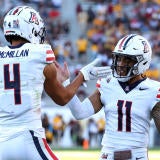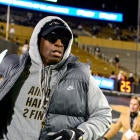The understandable reaction to the latest Title IX lawsuit against Baylor is outrage. The allegations in the lawsuit are staggering, and if true, would surpass anything that previously surfaced publicly in Baylor's sexual assault scandal.
- The lawsuit states at least 52 acts of rape from 2011-14 by 31 Baylor football players. Baylor told The Wall Street Journal in October 17 women reported sexual or domestic violence involving 19 players from 2011-16.
- There were allegedly five gang rapes involving football players over four years, two of which involved 10 or more players.
- Coaches allegedly encouraged female students in the Baylor Bruins hostess program to have sex with recruits and players.
- A student athletic trainer, who accused a player of rape, allegedly agreed to have Baylor pay for her education in exchange for a non-disclosure agreement.
The public wants blood. Some fans and media are shouting for the NCAA to give Baylor the so-called "death penalty." My Twitter timeline after the lawsuit was filled with one common sentiment: "Shut them down."
The outrage is justified, though it must be stated these are allegations in a civil lawsuit. They're brought by attorney John Clune, who has become widely recognized as one of the most successful in the country for victims of sex crimes at universities.
"As hard as the events at Baylor have been for people to hear, what went on there was much worse than has been reported," Clune said in a statement.
The lawsuit is a sickening read. But these latest allegations, like Baylor's vague findings and other information that's come out through reporters, may not result in the NCAA hammering Baylor like many people desire. The NCAA doesn't have rules on its books to punish schools with cultural failures in their athletic department around violence against women.
As awful as this has gotten for Baylor, the NCAA doesn't look like the best avenue to address it. Civil lawsuits and a federal investigation by the Office for Civil Rights (OCR) could produce far more effective discovery than anything obtained by the NCAA, which lacks subpoena power.
"I think the inclination is to always try to identify somebody that has standing to do something, and probably OCR is well positioned right now to act on these things," Big 12 commissioner Bob Bowlsby said. "I know the OCR people have been on [Baylor's] campus. The conference and NCAA might have steps that are clearer after that process has run its course."
Making up interpretations on the fly didn't work for the NCAA when it took the moral high ground in the Penn State scandal with Jerry Sandusky. The NCAA found itself woefully out of place by wading into criminal activities, and Penn State's penalties got overturned after the NCAA was sued. The NCAA is very leery of going down that road again with Baylor without clear jurisdiction.
"I've spoken with a lot of people from the Big Ten and the NCAA about the Penn State process, and one of the things I've learned is when you don't have clear standing, you tend to have to be more responsive than aggressive on it," Bowlsby said. "I wish it was otherwise. Anybody that cares about young people is appalled by that sort of allegation [52 rapes over four years], and by what appears to be that sort of environment."
The NCAA has encouraged all three divisions to develop legislation to fight violence against women. Brenda Tracy, who was gang-raped by Oregon State football players in 1998, has led efforts to create an NCAA committee to combat campus sexual violence.
But there's some apprehension about whether the NCAA is the right governing body to handle these issues. For example, the SEC became the first conference to ban transfers who have a history of serious misconduct (sexual assault, domestic violence, dating violence, stalking or other conduct that creates safety concerns).
SEC commissioner Greg Sankey, while not speaking specifically about Baylor, suggested conferences are better suited than the NCAA to respond to these issues because conferences can react quicker and understand the real-time recruiting dynamics regarding players with questionable behavior.
"There's been plenty of criticism in the national enforcement infractions process," said Sankey, the chair of the Division I Committee on Infractions. "That may be a cautionary tale for the NCAA as it approaches these issues. We also recognize we've got Department of Education requirements that already exist. We have laws. It's not as if the NCAA is filling a vacuum."
Frankly, Baylor has much bigger issues at the moment than the NCAA. Two former Title IX officers at Baylor filed complaints with the Department of Education. One claimed feeling intimidated to investigate sexual assault cases, especially involving football players. Another said Baylor still violated Title IX provisions even after recommended changes, a charge the school denied.
Baylor is now up to five federal lawsuits in the wake of the scandal.
There are ways the NCAA could eventually act against Baylor. One is if Baylor players are found to have received impermissible extra benefits through the university's disciplinary process. In other words, if Baylor athletes were shielded or treated differently when accused of rape than non-athletes, extra benefits would be fair game.
Another area for the NCAA could be potential recruiting violations. The latest lawsuit alleges Baylor's coaching staff "arranged for women to have sex with recruits on their official campus visits." The lawsuit states former assistant coach Kendal Briles, son of former Baylor head coach Art Briles and now a Florida Atlantic assistant, told a recruit, "Do you like white women? Because we have a lot of them at Baylor and they love football players."
Oklahoma State was punished in 2015 for violating NCAA rules regarding hosting duties for recruits by all-female hostess groups. There had been allegations Oklahoma State used sexual favors to entice recruits, but the NCAA said those claims were unfounded.
Baylor has stayed silent about the specific allegations in the latest lawsuit, other than to express compassion for any victims of sexual assault and note improvements it's making. Clune previously reached financial settlements with Baylor for three other women who said they were sexually assaulted by football players. Art Briles' attorney, Ernest Cannon, disputed the culture of Baylor's football program as described in the lawsuit.
"If they were doing that it would be terrible, but they weren't doing that. Art wasn't involved in anything like that," Cannon told the Associated Press. "Lawyers have great imaginations when money is involved. It's really sad."
The drip, drip, drip of disturbing news isn't going away anytime soon for Baylor. Ask Penn State how long a story like this can linger.
The culture at Baylor didn't turn bad overnight, and it's not going to improve overnight. Patience is needed, but that's very hard for fans, who often talk about sexual assault only when it intersects with sports.
Football got too big at Baylor. It's best to avoid making the aftermath all about football, too.





















